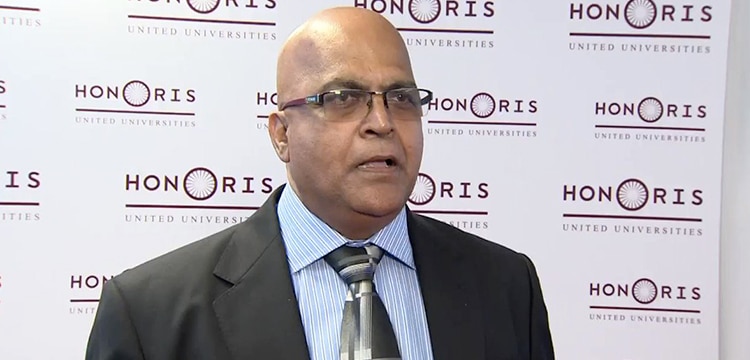Leadership, 21st Century Skills by Professor Reshad Jaumally, Chairman of Honoris Educational Network in Mauritius
Current predictions posit that, by 2030, one in five people will be African. Already today half the continent is under the age of 20, and all 10 of the world’s youngest countries are in Africa. This translates into a mighty workforce for the next several decades, and a substantial pool of potential future leaders to serve at all levels, from local community to international.
The world that these young people will be inheriting will be fully embedded in the 4IR, with disruptive digitalisation, augmentation and ongoing shifts. Future leaders will need to step up to the challenges and define the way forward, charting a path through rapidly changing technological, economic and social landscapes. They will need to redefine leadership for their own era.
Adept at managing rapid change
A primary driver of 21st century change is, of course, technology, and it is being embraced by Africans at a rapid pace: the vast majority already have access to a mobile phone service, and cell phone networks have grown faster than any other area of core infrastructure over the past decade.
The fast-emerging digital ecosystem will multiply growth and innovation as access to smartphones and other devices enhances consumer information, networking, job-creating resources, and even financial inclusion. Progress toward goals such as education access, climate change mitigation, and service delivery can all be enhanced by digital tools both already available and on the horizon.
In the upcoming decades of rapidly developing technologies and exponential change, agile thinking and a mindset that embraces lifelong learning will be key. A 21st-century future-ready leader needs to be adept at making small and rapid decisions and responding quickly when the context changes.
As business, social and political life moves increasingly online, leaders will also need to be virtually agile, supporting and nurturing effective and responsive virtual teams. Multi-speed management, wherein organisations and groups support multiple objectives, may be an ideal approach for leaders in the 4IR.
Almost everything that matters for youths of today revolve around technology, AI, educational platforms and sophisticated laboratories geared at producing the much-desired leaders of tomorrow equipped with agile mindset, higher rate of employability and accelerated growth. Another impact of this novel way of life will enhance transfer of technologies within Africa, the actions of which shall witness new level playing grounds and mobility across the Continent.
Young Africans, who have grown up in an era of transformative innovation and disruption, will know that an entrepreneurial spirit can turn fresh ideas into solutions that hold the seeds of prosperity for the continent.
Focused on equality and inclusion
At same time, future leaders need to be prepared for – and accountable for – the negative effects of rapid economic growth, including environmental degradation and the increasingly stark division between the “haves” and the “have-nots” of Africa. Unlike in more evenly developed regions, such as in Europe, the UK and the US, technological development here is hugely outpacing infrastructural development: less than two thirds of Africans now have access to piped water, while less than a third have access to modern wastewater systems.
Inclusion is crucial for opportunity and innovation to truly take root across the continent, and thoughtful leaders will need to address the systemic causes of poverty and focus on economic empowerment, the leadership of women, and the development of good schools and quality health departments. The UN, for example, estimates that discriminatory gender policies in sub-Saharan Africa cost the region up to $105 billion each year, or 6% of its GDP. Young leaders should aim to create a powerful network of inspired, ethical thinkers and doers who are working together to achieve extraordinary social impact.
Leadership with ethics
Positioned within an era of ever-shifting external factors, African leaders need to have a strong inner axis and sharp clarity on personal values. Ethical serving of their communities through values-based leadership helps provide a pillar of stability in a world in flux.
An African approach
While successful leaders anywhere in the world in the 21st century will require the key traits of resilience, a strong sense of self, flexibility and vision, specific styles of leadership take the shape of the culture in which they are embedded.
When it comes to Africa, scholars have suggested that Africans return to pre-colonial heritage, history, and creativity to learn strategies that might fit their own unique characteristics and requirements, rather than continue to make use of Western-based leadership models, which were often imported during colonial times. These alternative forms of governance have been referred to as the “African Way”.
The concepts of Ubuntu (“I am because we are”) and Umoja (togetherness), for example, helped shape political processes in post-Apartheid South Africa. Today’s concept of collective intelligence – collaborative efforts and consensus decision-making – is rooted in ancestral behaviours such as these.
However, while looking to Africa’s pre-colonial past, new forms of African leadership will be required to leave behind narrowly assumed traditional values and embrace a cosmopolitan African identity, which supports minority, gender, cultural complexity as positive vectors for growth and wellbeing.
It will be this technologically savvy, innovation-hungry, cosmopolitan youth that harnesses the 4IR and propels the continent into a new, empowered future as it steps out on to the world stage. Young African entrepreneurs, whose numbers are increasing significantly, are already leading their communities. While many countries around the world, including in Asia, Europe and the US, face an aging population, in Africa the youth will need to be engaged, cultivated, and included in decision-making forums to prepare them for active leadership.
Africa’s future leaders will be bold, confident, agile and relentless in their pursuit of excellence, but they will also be ethical and values-driven, and see leadership as a form of selfless service. Our continent depends on their vision.


